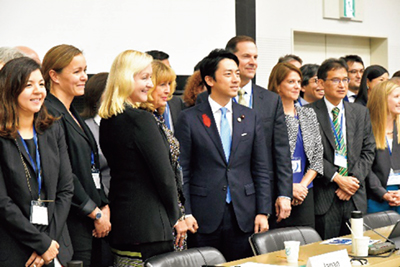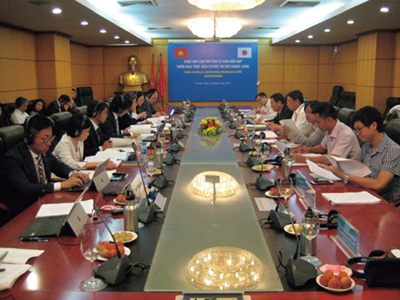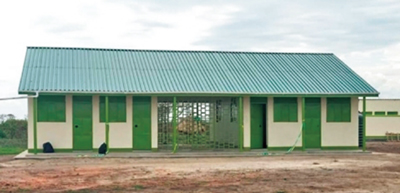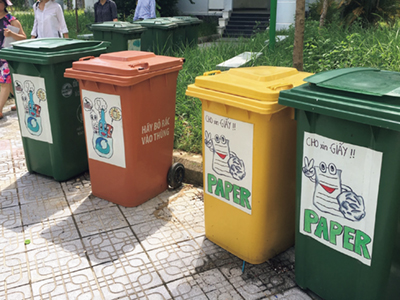(6) Environment and Climate Change Actions
The importance of initiatives to address environmental and climate change issues is recognized globally, as such issues have been repeatedly taken up as one of the main topics at the G7 and G20 Summits, and are also mentioned in the Sustainable Development Goals (SDGs) adopted at the UN Summit in 2015. Japan has been vigorously working on addressing these issues, and will continue to actively participate in discussions in the international community.
●Japan’s Efforts
Conservation of the Marine Environment

Minister of the Environment KOIZUMI Shinjiro attending the photograph session at the G20 Resource Efficiency Dialogue and Follow-up of the Implementation Framework for Actions on Marine Plastic Litter (October 2019) (Photo: Ministry of the Environment)
Marine plastic litter is a pressing issue that can have an adverse impact on the marine ecosystem, tourism, fisheries, and human health. In recent years, measures to address this issue have become increasingly important. At the G20 Osaka Summit in June 2019, under Japan’s leadership as the G20 Presidency, the member countries shared the Osaka Blue Ocean Vision, which aims to reduce additional pollution by marine plastic litter to zero by 2050. In order to achieve the Vision, Japan announced that it would support capacity building, infrastructure development, and more concerning waste management in developing countries, and launched the MARINE Initiative that focuses on (i) MAnagement of wastes, (ii) Recovery of marine litter, (iii) INnovation, and (iv) Empowerment, to encourage effective marine plastic litter measures worldwide. Under the Initiative, Japan will continue to support capacity-building in developing countries to promote waste management, collection of marine waste, and innovation through specific policies (see “ODA Topics” for details).
In addition, at the G20 Osaka Summit, the G20 Implementation Framework for Actions on Marine Plastic Litter was endorsed to promote cooperation on effective measures by the countries toward realizing the Osaka Blue Ocean Vision. Consequently, in October 2019, the G20 Resource Efficiency Dialogue 2019 and Follow-up of the G20 Implementation Framework for Actions on Marine Plastic Litter was held in Tokyo. During the meeting, the measures and good practices of the various countries were reported and shared based on the Implementation Framework, and it was reaffirmed that the countries will promote measures and policies through mutual study by the governments of each country and international organizations, as well as other means, in order to realize the Osaka Blue Ocean Vision.
Moreover, as part of expanding assistance for ASEAN concerning marine plastic litter that was announced at the Japan-ASEAN Summit Meeting in November 2018, Japan has provided trainings in Japan on survey and analysis methods on marine plastic litter, including microplastics, from August 2019. By the end of September 2019, nine people from Indonesia, Viet Nam, Cambodia, and Thailand have participated in the training. In addition, preliminary surveys for local pilot joint surveys concerning marine litter were held in Indonesia in September 2019 and in Viet Nam in November 2019. Furthermore, at the Eighth Japan-China-ROK Trilateral Summit held in December 2019, Japan, China and the Republic of Korea affirmed that they would promote joint efforts regarding issues of common interest including marine plastic litter.
Climate Change

The 8th Joint Committee between Japan and Viet Nam concerning the JCM (May 2019)
Climate change is a global issue that requires a cross-border approach, and strengthening concerted efforts by the international community including both developed and developing countries is needed. Given the fact that the Kyoto Protocol adopted in 1997 imposed the obligations of reducing greenhouse gas (GHG) emissions only on developed countries, the Paris Agreement was adopted at the 21st Session of the Conference of the Parties to the UN Framework Convention on Climate Change (COP21), held in Paris in 2015, as a new framework under which all countries would work toward GHG emission reductions. The Paris Agreement entered into force in 2016. Upon the adoption of the Paris Agreement, negotiations concerning the implementation guidelines commenced toward its full implementation after 2020. The implementation guidelines were adopted at COP24 in 2018. However, an agreement was not reached at COP24 on the implementation guidelines of the market mechanisms. Since the parties were not able to reach an agreement at COP25 held in Madrid, Spain, in December 2019 as well, it was decided that negotiations will continue with a view to adopting the guidelines at COP26. On the other hand, concrete progress was observed on agenda items such as loss and damage (loss and damage associated with the adverse effects of climate change), gender and climate change, and the impact of implementing response measures (social and economic impacts arising from the implementation of mitigation policies and actions).
In June 2019, Japan’s Long-term Strategy under the Paris Agreement was approved by the Cabinet, with its ultimate goal of realizing a decarbonized society as early as possible in the second half of this century. In the field of climate change, new technologies are being created that are key to realizing a decarbonized society in relation to carbon recycling such as artificial photosynthesis, carbon capture, utilization and storage (CCUS), and hydrogen. The aim is to realize “a virtuous cycle of environment and growth” through the promotion of such innovation, introduction of private financing, and improvement of business environments.
Moreover, Japan is actively supporting climate change actions in developing countries. As part of this effort, Japan is promoting the “Joint Crediting Mechanism (JCM),”* which facilitates the global application of Japan’s advanced low carbon and decarbonized technologies, including in developing countries. This will contribute to GHG emission reductions in developing countries, and enable the bilateral sharing of the results. In 2013, Japan signed the first bilateral document pertaining to the JCM implementation with Mongolia, and to date, it has established the JCM with 17 countries as of the end of 2019. So far, the JCM credits have been issued from 33 energy-saving and renewable energy projects in Indonesia, Mongolia, Palau, Viet Nam, Thailand, and other countries. These JCM projects are contributing to emission reductions worldwide.
In addition, Japan supports developing countries through its contribution to the Green Climate Fund*, the world’s largest multilateral climate fund. In October 2019, Japan announced that it would contribute up to $1.5 billion to the GCF’s First Replenishment in addition to its initial contribution of $1.5 billion at the High-Level Pledging Conference held in Paris. In the GCF, a total of 124 projects have been approved by December 2019, with a large number of them entering the implementation phase. In July 2017, JICA and MUFG Bank were approved as GCF’s Accredited Entities, and in July 2019, a proposal by MUFG Bank was adopted as its first project, which would construct solar power and pumped-storage hydroelectricity facilities in Chile.
Biodiversity

Assistance to Uganda in Developing a Strategic Anti-Poaching Outpost for Elephants by the Government of Japan
Expansion in the types, scope, and scale of human activities has given rise to serious concerns about further degradation of habitats and the destruction of the ecosystem in recent years. Japan places importance on biodiversity initiatives, such as hosting the 10th Meeting of the Conference of the Parties to the Convention on Biological Diversity (COP10)* in Nagoya City, Aichi Prefecture in October 2010. With the aim of providing support for measures such as the capacity development of developing countries toward the achievement of the Aichi Biodiversity Targets,* Japan contributes to the “Japan Biodiversity Fund,” through which the Secretariat of the Convention organizes workshops to support the implementation of the National Biodiversity Strategies and Action Plans. In addition, Japan held the Regional Consultation Workshop for Asia and the Pacific in Nagoya City in January 2019 as part of the process of formulating the Post-2020 Global Biodiversity Framework, including the next global goals that will replace the Aichi Biodiversity Targets. During the Workshop, Japan’s contributions to the formulation of the Framework were explained.
In recent years, illegal trade in wildlife, including elephant ivory, has become an increasingly serious issue. It is also drawing the attention of the international community as one of the sources of funding for international terrorist organizations. Along with actively participating in the discussions at the Convention on International Trade in Endangered Species of Wild Fauna and Flora (CITES), Japan works on resolving these issues in cooperation with the international community through contributing to projects implemented by the CITES Secretariat. Specifically, Japan supported the construction of facilities for implementing elephant poaching countermeasures in Uganda and Mozambique and held handover ceremonies in April and July 2019, respectively.
Environmental Pollution Control Measures

Garbage bins to promote 3R placed at an elementary school in Thua Thien Hue Province, Viet Nam through support from Japan
Japan has accumulated abundant knowledge, experience, and technology related to environmental pollution control measures, and has been utilizing them to solve environmental pollution problems in developing countries. At the Conference of Plenipotentiaries on the Minamata Convention on Mercury held in Japan in 2013, Japan took the lead in the adoption of the “Minamata Convention on Mercury” as the President, and this Convention entered into force in August 2017. Japan is exercising continuous leadership in promoting the management of global mercury pollution by proactively transferring to the world its technology and know-how on preventing adverse effects caused by mercury, accumulated through its experience with the Minamata disease(Note32). At the Third Meeting of the Conference of the Parties held in November 2019, Japan was elected to the Implementation and Compliance Committee that promotes implementation and compliance of the Convention, and is actively contributing to the international rules-making of mercury regulations.
In addition, in the field of waste management, the Ministry of the Environment held the Ninth Regional 3R Forum in Asia and the Pacific in Bangkok from March 4 to 6, 2019 jointly with Thailand’s Ministry of Natural Resources and Environment and the United Nations Centre for Regional Development (UNCRD). During the Forum, various countries shared information on systematic and technological aspects useful for the promotion of 3R(Note33), and as the outcome document, the Bangkok 3R Declaration Towards Prevention of Plastic Waste Pollution through 3R and Circular Economy was adopted. Moreover, the 2nd General Meeting of the African Clean Cities Platform (ACCP) was held as an official side event of TICAD7 in Yokohama from August 26 to 27, 2019. The ACCP was established by the Ministry of the Environment together with JICA, Yokohama City, the United Nations Environment Programme (UNEP), and the United Nations Human Settlement Plan (UN-Habitat) in April 2017 with the goals of, among others, sharing knowledge concerning waste in Africa and promoting the achievement of the SDGs. The Yokohama Action Guidance for the ACCP, which indicates the direction for future activities of the ACCP, was adopted as an outcome document of the meeting. It was affirmed that the results of the meeting will be incorporated into TICAD7, and there will be further promotion of waste management in various African countries. Consequently, the Yokohama Plan of Action 2019, the outcome document of TICAD7, included a description concerning the ACCP as an initiative to enhance waste management systems.
- *Joint Crediting Mechanism (JCM)
- A mechanism to appropriately evaluate contributions by Japan for GHG emission reductions or removals in a quantitative manner through the provision of Japan’s advanced low carbon and decarbonized technologies, products, systems, services, and infrastructure to developing countries and implementation of greenhouse gas reduction projects that aim to diffuse them, as well as the utilization of the achieved reductions as “credit” to achieve Japan’s emission reduction target.
- *Green Climate Fund (GCF)
- A multilateral fund established by the decision of the Cancun Agreements adopted at COP16 in 2010, in order to support developing countries in reducing/sequestering their greenhouse gases (mitigation) and enhancing their ability to respond to climate change (adaptation).
- *Convention on Biological Diversity (CBD)
- A convention adopted in 1992 due to the need to address biodiversity issues on a global scale as the issues related to living organisms are borderless. The objectives of the CBD are the following: (i) conservation of biological diversity, (ii) sustainable use of the components of biological diversity (utilizing living things, etc. for resources into the future while maintaining diversity at the levels of ecosystems, species, and genes), and (iii) fair and equitable sharing of the benefits arising from the utilization of genetic resources. Through the provision of economic and technical assistance to developing countries from developed countries, the international community as a whole facilitates the conservation and sustainable use of biological diversity worldwide.
- *Aichi Biodiversity Targets (The Strategic Plan for Biodiversity 2011 - 2020)
- Aichi Biodiversity Targets were set out in the Strategic Plan for Biodiversity 2011 - 2020 of the Convention on Biological Diversity adopted at COP10 in 2010. It sets a goal to realize “Living in Harmony with Nature” by 2050, and established 20 individual short-term targets called the “Aichi Biodiversity Targets” in order to implement actions to halt the loss of biodiversity by 2020.
- Note 32: Minamata disease is a toxic nervous disorder caused by ingesting fish and shellfish contaminated with methylmercury compounds discharged from chemical plants. The disease was officially acknowledged in May 1956 in and around Minamata Bay area in Kumamoto Prefecture, and in May 1965 in the Agano River basin of Niigata Prefecture.
- Note 33: A term referring to the first letter of Reduce (reduce waste), Reuse, and Recycle.
